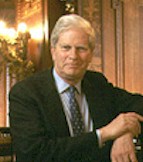
Billington
Library of Congress Will Not Digitize Books
(April 15, 2000) The Librarian of Congress, James Billington, gave an address at the National Press Club on Friday, April 14, on the role of the Library of Congress in the Information Age. He harshly criticized the Internet, and stated that the Library will not digitize books. However, the Library has plans to expand its web publication of other materials.
| The Library of Congress's forthcoming web site, which James Billington describes as "America's web site", will be located at americaslibrary.gov, starting on April 24. |
"So far, the Internet seems to be largely amplifying the worst features of television's preoccupation with sex and violence, semi-literate chatter, shortened attention spans, and near-total subservience to commercial marketing," said Billington.
Billington said that the Library of Congress has plans to unveil a new web site. "We hope it will realize one of the earliest promises of the Internet: to put the Library of Congress at the fingertips of every boy and girl where they live."
But then he followed up by stating the "we are not digitizing books, but bringing hitherto little used, specially formatted materials like maps and recordings ..." He added that the new web site "is not replacing our traditional print library."
He said that the Library of Congress now has 28 Million items in its print collection, and 119 Million items in all formats. Its web site currently contains 3 million primary documents, including drafts of the Gettysburg Address, 19th Century baseball cards, and forgotten music.
 |
|
| James Billington |
Billington elaborated on why the Library will not put books online during the question and answer session. "The rationale is two fold. We have so much special format material that nobody has seen that it is more important to get those out." He added that the Library is more concerned with "rare pamphlets" than "full books".
"Secondly, behind this ... is an implicit belief [that books] are not going to be replaced, and should not be replaced."
"There is a difference between turning pages and scrolling down," he said. "There is something about a book that should inspire a certain presumption of reverence."
"We should be very hesitant ... that you are going to get everything you want electronically."
"You don't want to be one of those mindless futurists," said Billington, "who sit in front of a lonely screen."
"It is isolating. It is a lonely thing." In contrast, "libraries are places, a community thing."
"It is dangerous to promote the illusion that you can get anything you want by sitting in front of a computer screen." He described this as "arrogance" and "hubris".
He added that while electronic books may succeed commercially, they are "seductive."
Tech Law Journal asked Billington if there is any parallel between hostility to the printing press in the late 15th and early 16th Centuries, and hostility to the Internet today. He stated that there is, but that there is also a significant difference. Billinton explained that some of the hostility to the printing press originated because cheap reproduction made books and pamphlets available to more people. Previously, only kings and an elite few had access to libraries. The printing press made the public library possible. Billington stated that in contrast, public libraries are a "political institution" today.
He also stated that the Reformation was largely fought with the printing press, and that "media revolutions provoke intense debate."
Billington was also asked whether public libraries which provide Internet access for their patrons should use filtering software. He responded that "we don't provide an answer."
However, he elaborated that "there should be no question that the tradition of free public libraries ... is the absolute platform of essentiality for our democracy." Furthermore, in public libraries "there is an inherent adversity to censorship."
He said that at the Library of Congress, the focus is to provide "an example of the good." In contrast, if the government gets into "defining the bad, you get onto the slippery slope of defining the bad."
He added that communities should be free to decide.